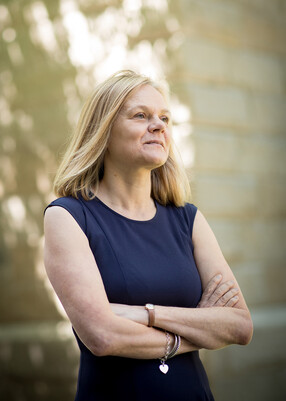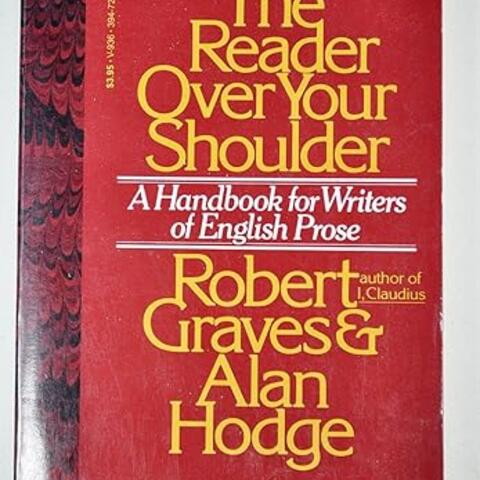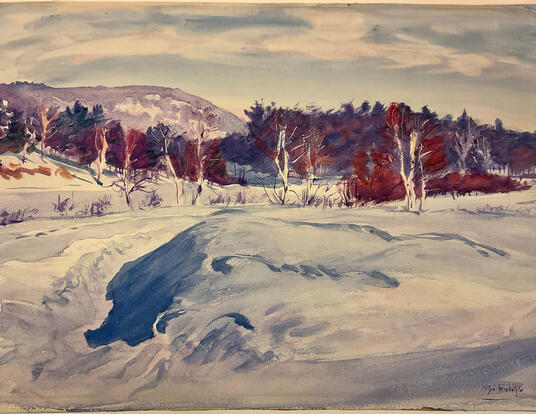A Dialogue with Dean Dench
Notes From a Writer's Desk
Emma Dench, McLean Professor of Ancient and Modern History at Harvard University and the Dean of the Harvard Kenneth C. Griffin Graduate School of Arts and Sciences, sat down with postdoctoral fellow Anthony Shannon to discuss her approaches to writing and research, and to provide some words of wisdom for graduating and continuing students in GSAS.
Let’s start by reflecting on not just your writing process today but also your writing process in the past. How would you describe it? Has it changed over the years?

So, I’m going to be really, really honest, and I think this is probably helpful. Super fraught. Very, very fraught. Especially as an undergraduate, I had absolutely terrible problems with writing. So, so bad. I share this publicly that I elected to take a year off to sort myself out. So it’s a really fraught business for me. And it has changed over the years, I’ve had to get it under control. This will come out as we talk, but I try to treat it much more like a job.
I keep at it rather than just constantly being frustrated at myself that I can’t get to some sort of brilliant idea. I often sort of pressure myself, you know, “Where’s the brilliant idea?” And there’s nothing there, so I have to be far more methodical about it.
I learned, after a really terrible time in the second half of my undergraduate career, to do something which I always encourage any students or anybody else who is having trouble with writing [to do]: write with a clock. Decide on a length of time that you’re just going to have a go, and try and take the pressure off you. A lot of my processes try to take the pressure off. We’re all overachievers who take on the pressure of trying to produce something brilliant. Try to go for something that’s good enough. And above all, just get it on paper and keep at it.
Even if it’s just for a set amount of time each day, I would suggest having that time that you spend on writing…and just hold yourself to it. And when your alarm goes off, go and do something else. This writing appointment, it’s like exercise. It's essentially the same thing, just for the brain instead of the body.
How have you kept your research and writing process feeling fresh and interesting?
You know, I think working on a discipline that’s—I always quote Joni Mitchell—“old, cold, and settled in its ways,” I’ve tried to use that as a provocation a little bit, and to try and get engaged in our arguments, thinking about why a conversation is patterned the way it is. Often it’s because the pattern of the conversation feels very close to me, so I try to license myself to react to it. Many of us don’t think we have something to say, we don’t think we are good enough to intervene in the conversation. You have to kind of gear yourself up and say: “Yeah, this makes me cross.” You probably remember, one of the things I try to provoke in myself and also in students is boredom. Why is this boring? Why is this—don’t just think it’s boring, but why is it boring? Often that gets me. I need to get a little bit excited and possibly a little bit angry to write well. I like humor, I like anger, a bit of, you know, high emotions. And that usually can sharpen an argument and a voice. We’re all trying to find our voices.
Many students find it difficult to get started on a writing project, whether it is a course paper, conference presentation, an article, or even their dissertation. What advice would you give a student to set themselves up for success in the initial stages of the writing process? You already touched on your writing process as a whole, but how would you help students get the ball rolling or light a fire under them?
I think the first thing, the second thing, and the third thing is to start somewhere, anywhere, and tell yourself very firmly: “I’m just starting.” It’s a really frightening process and I think that’s behind the question. We hold ourselves to very high standards. We wouldn’t be here if we didn’t. And it’s really, really intimidating. And I try to be very kind to myself. Leave yourself some time and try to start ages ahead. I’m slightly neurotic about that. Start way, way ahead and do something, read something. And once you start, just be kind. Don’t expect too much for yourself. Make yourself a checklist of the low-hanging fruit, the obvious things, like articles you need to read, questions that are really obvious. I think the more you can have that process, a very routinized process, and have time for inspiration, is really good. And inspiration…the only way I can get inspired is going for a walk. Have a walk with family or other people, or any other kind of exercise. So do some…mundane work and then walk often, if you possibly can. It gets the brain gears going. You have to do the just boring, basic work and then you give yourself a chance to get the brain gears moving. It could be anything, like cleaning your apartment, or something that engages you physically and frees up your mind. Don’t pressure it. Just let the stuff come.
The summer is now upon us. Have you found that you are more or less productive during the summer compared to the academic year? What tips do you have for maintaining a balance between research, writing, and life during long breaks from the regular structure of the academic year?
Right now, there’s really not a lot of difference. I have very, very little time for research of any kind, especially since the onset of COVID. Having said that, though, I think one big tip is that we all get very hard on ourselves. When you see a stretch of time that has fewer written-in commitments, I think honestly that you should try and tell yourself to not be too hard on yourself and, insofar as it’s possible, don’t save up enormous, unbroken projects to start, pursue, and finish in the summer. Because I really, really believe that writing well and getting good stuff done is just really a pain. Most of it is about routine.
You know, I totally get it. I am so burned out now, and when I was a faculty member, by the summer you’re so burned out and the temptation is to say “Oh, I’ve got loads of time.” But don’t; that just sets yourself up for real disappointment and not doing your best work. So I would do everything you can to structure the summer. Have a really concrete structure that writes in free time and writing time, if that fits what you are able to do, or what you want to do. Be realistic with the time in your schedule. Don’t just think “Oh, I can write six books in the summer!” That never stops, that kind of completely unrealistic expectation. You can’t.
I would really recommend against, if you possibly can, the idea that you’re going to work for 10 hours a day on your research and writing in the summer. I’ve never—I don’t think I’ve ever done that in my life, because I don’t think that’s how you do your best writing. Everybody’s different, of course, but I probably have a maximum number of hours per day in which I can really, really actively do research and writing, about six hours, and if I’m actually focusing 100 percent for six hours a day, I’m dead on the floor.
When you know that you have a project that you need to do or want to work on during the summer, what do you do before you even start? Do you plot it out? Do you give yourself deadlines? Or do you just let it flow and just sort of work from there?
I know exactly what you mean. It’s a bit of a combination. You know, I don’t want to psychoanalyze myself too much, but I definitely have this sort of super ego or something that tells me, and it’s usually ridiculously right, it pressures me in a ridiculous way. In my ideal self, I like the idea that I’ll have something finished, you know, ages before it’s time. But realistically, in terms of my actual process, what I often do with projects is actually a combination. I figure out the hours that I spend working each day, and I try and map that out through a week or something like that. Then, I also think about word count. So I think I’m going to write three pages, or if I can get up to one thousand words, that would be fabulous. I usually slip, but having that goal helps. I want to be at that stage. I always have a rough idea of when I want to complete a draft, and I think that’s helpful, because I think otherwise you’re always going to think “Oh, I’m not ready!” I also have this slightly nasty version of myself in my head that goes “You have to finish this, otherwise you’ll die” or something.
Your internal professor?
Yes. Exactly. No excuses!
GSAS will be conferring degrees on a fresh batch of masters and PhDs next week. What words of wisdom do you have for these students who are transitioning into the next phase of their lives? And what advice do you have for those students who will continue the pursuit of their degrees in the coming year(s)?
These are great questions! So, when you’re doing a kind of long-term graduate project, you’ve often, but not always, lived with it for a long time. And I think one of the things I always want people to do when they graduate is actually really, really take a moment, very intentionally, to reflect on just what an amazing thing they’ve done. Because I think, since we are talking about writing, by completing a graduate level thesis or dissertation, you’ve pretty much by definition broken new ground. Many, many of our graduating students have completed projects that will have had all sorts of naysayers along the way. I bet you did too. You know, “This is impossible” or “Why don’t you just do this? Why don’t you just do that?” And I think just taking a moment is beneficial, because it’s been so cumulative and there hasn’t been that big bang moment when it’s just like “Man, I got an A-plus on my finals” or something like that. Also, I think the nature of having completed a major graduate-level project is that a lot of the reaction you get—hopefully, you get lots of congratulations—usually sounds like “What’s next?” or “Why didn’t you write about this?” I think it is so necessary now, and for every other kind of graduation, for students to have moments when they think “Oh my god, I have done this!” And I think it’s really, really important for the students graduating from GSAS to do that and to think about, not to be clichéd, but to think about the journey, and about the moments when they didn’t think they could do it, and what it’s taken to crack these really, really hard problems and get to something or some place no one else has got to before. Even when I talk to alumni, they can be doing any sort of job in any sector—and I talk to alumni from every sector you could imagine—and they all see that overcoming really, really big problems, and often having to persist when anybody else would have given up, is huge. Really huge. So, whether you are finishing up or continuing on, just remember to take a moment and think about everything you’ve actually done and what you get to look forward to.
Get the Latest Updates
Join Our Newsletter
Subscribe to Colloquy Podcast
Simplecast




